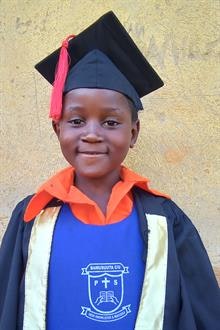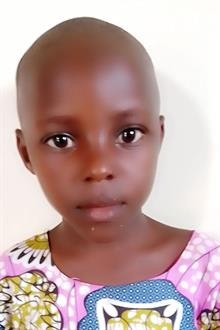Since 2024, Holt has partnered with the organization Home Free to advance domestic adoption in Uganda — including for one 7-year-old girl named Natalie and her adoptive mom, Grace. Read their story and learn how Holt sponsors and donors are helping to support domestic adoption as a path to a permanent, loving family for children who would otherwise grow up in orphanages.
Seven-year-old Natalie is a joyful and affectionate child who loves music. She has short-cropped hair and holds a warm, thoughtful expression as she sits beside her mother, Grace, whose radiant smile is full of laughter. Grace isn’t Natalie’s birth mother, but she has cared for Natalie since she was a baby.
“Natalie had been abandoned at birth and was a very sick baby,” Home Free, our partner in Uganda, shares. “When a government social worker reached out to Grace about a baby in need of a family, she began making regular visits, slowly forming a quiet but powerful bond. When Natalie turned three months old, Grace brought her home — not just as a foster child, but as the daughter she had longed to love.”
Last year, with the support of Holt’s team in Uganda and our partner Home Free, Grace completed the steps to formally adopt her.
Home Free’s mission — like Holt’s — is to help children who are orphaned, abandoned or confined to facilities to grow up in safe and loving families. The Uganda-based organization works to reunite children with relatives, support families in crisis, and provide foster care and adoption to children in need.
In December 2024, five children — including Natalie — were officially adopted through this program, and 15 more children are currently moving through the adoption process in Uganda. Without the joint collaboration of Holt and Home Free, these children would likely never be legally adopted.
Like Holt, Home Free strives to help children reunite with their birth families before ever considering adoption. But the reality is clear: not every child can rejoin their birth family. And for those children who can’t stay with their birth family, joining an adoptive family is a far better outcome than growing up in an institution.
“Many orphanages in Uganda are not well resourced and there is little regulation,” explains Malia Robello, Holt’s senior program manager for Uganda. “Children often remain in the orphanages and suffer from poor nutrition, limited access to healthcare, social isolation and few educational opportunities.”
Tragically, children living in orphanages also sometimes suffer abuse at the hands of the people entrusted to care for them.
When Home Free first met Grace in 2017, she was fostering both Natalie and a one-year-old boy from the same orphanage. “Her foster son had experienced severe abuse and neglect in the facility and nearly lost his life as a result,” Home Free shares.
Although Grace struggled at first with his trauma-caused behaviors, she devoted herself wholeheartedly to nurturing him back to health. And with support from Home Free’s social work team to understand his trauma, their relationship grew stronger — and he began to heal.
Reflecting on her children’s experiences in orphanages, Grace shares that no child should endure abuse, neglect or hunger in a place meant to protect them. Every child deserves the chance to grow up in a safe, loving family.
“Adoption saves lives,” she says with conviction.
Partnering for Children in Uganda
Holt’s team in Uganda began partnering with Home Free to help complete domestic adoptions in 2024.
“Domestic adoption requires administrative and legal steps that can be hard for families to navigate on their own,” Malia shares. “Potential adoptive parents must coordinate with social workers, government entities, attorneys, courts and other service providers, and the process is not always clear. The expense of legal and court fees is also a barrier for most families wishing to adopt. This is where Holt comes in.”
While Home Free had developed incredibly successful foster and kinship care programs, Holt has long supported and advocated for domestic adoption in countries around the world — and could offer a unique expertise in navigating complex in-country adoption processes.
Holt’s team in Uganda trained Home Free social workers on the adoption requirements and case file preparation. With this training — as well as additional financial support from Holt sponsors and donors — Holt’s team supported Home Free to complete the administrative steps for adoption applications, including adoptive parent assessments, background checks, family tracing to ensure children could not remain with their birth families, child medical checks-ups, and help convening district alternative care panels to approve adoption placements.

With donor support, Holt also covers the court/legal fees required for formal adoptions.
“Basic legal fees, investigation reports and court processes alone cost up to $1,500 per child, and this does not include the cost of assessment reports, background checks and other services that are required,” Malia says. “For a typical family in Uganda, these expenses are a huge barrier, which is one reason domestic adoption has not progressed in the country.”
The cost of adoption was also a barrier for Grace, who thought she had already adopted Natalie then was surprised to learn from Home Free that formal procedures were still needed.
“With the support of Holt donors, Grace was able to go through the administrative and legal process to become Natalie’s adoptive mother,” Malia says.
“I couldn’t have managed it alone—in terms of money, or even knowing what to do, when and how,” Grace says.
One important step was a medical examination arranged as part of the process, which revealed that Natalie had a heart defect.
“Thanks to that support, [Natalie] got the treatment she needed,” she says.
Changing Perceptions of Adoption
Today, Natalie and Grace share an unbreakable bond.
“She’s my prayer warrior,” Grace says. “Whenever she prays for something, it happens. She’s made me feel like a special mom.”
Still, the journey hasn’t always been easy.
“Some community members misunderstood Grace’s decision to adopt, and certain relatives felt she should focus on helping her nieces and nephews instead,” our partner shares.
While progress has been made, adoption is not yet widely embraced in Uganda.
“Informal kinship care or taking in a child temporarily is more common, but the lack of a formal/legal structure for this type of care creates issues with child protection and wellbeing,” Malia explains.
Motivations to adopt are also not well understood.
“A lot of people wonder why a foster/adoptive family would not instead use their financial resources toward their own children, or care for family members in need,” Malia continues. “Many don’t know the conditions of orphanages or the impact of institutional care on a child, assuming the child has all their needs met at the orphanage. So we raise awareness of the positive, life-changing benefits of foster care and adoption.”
Through our the partnership with Home Free, Holt’s team in Uganda began holding information sessions for prospective adoptive parents — offering them a deeper understanding of adoption and the process involved. During these sessions, Holt and Home Free also address concerns that are challenging for prospective families to overcome without many positive examples of adoption in their community.
Reflecting on her children’s experiences in orphanages, Grace shares that no child should endure abuse, neglect or hunger in a place meant to protect them. Every child deserves the chance to grow up in a safe, loving family.
“It helps to have a community dialogue so people can hear about the motivations of families who wish to adopt and the benefits of providing children with a permanent, loving home,” Malia says.
While Grace has also had to overcome misunderstanding within her community, our partner shares that her close family — especially her mother and sisters — have embraced Natalie with love and pride.
They understand Grace’s motivation to adopt, which could not be more pure.
Growing up with a disability and facing rejection from her parents, Grace was raised by her grandmother, who helped her access the services she needed. Through this care and encouragement, Grace eventually learned to walk. As a foster and later an adoptive mom, Grace felt she could offer this same care and encouragement to orphaned and vulnerable children.
“I felt I had to love and support children that were rejected and neglected,” she says.
Grace’s courage has even inspired several friends to consider adoption themselves, and she encourages others to approach adoption with the right heart. “Wear the shoes of a true parent,” she says. “Don’t adopt to fill your own need — do it to give a child love and support.”
Next Steps to Get Children Out of Orphanages, Into Families
In December 2024, five children — including Natalie — were officially adopted through this program, and 15 more children are currently moving through the adoption process in Uganda. Without the joint collaboration of Holt and Home Free, these children would likely never be legally adopted.
To further our mission in Uganda, Holt is now beginning to work with orphanages in a district where sponsors and donors support children — to begin foster care and, eventually, domestic adoption services.
“This is separate from the Home Free project, which takes place in a district in which Holt does not have a presence,” Malia says. “However, the goal is the same – to get children out of institutional care and into family-based care.”
*This story was written in partnership with Home Free.

Help a Child in Greatest Need
Give emergency help to a child who is hungry, sick or living in dangerous conditions. Your gift will provide the critical food, medical care, safety and more they need when they need it the most.





